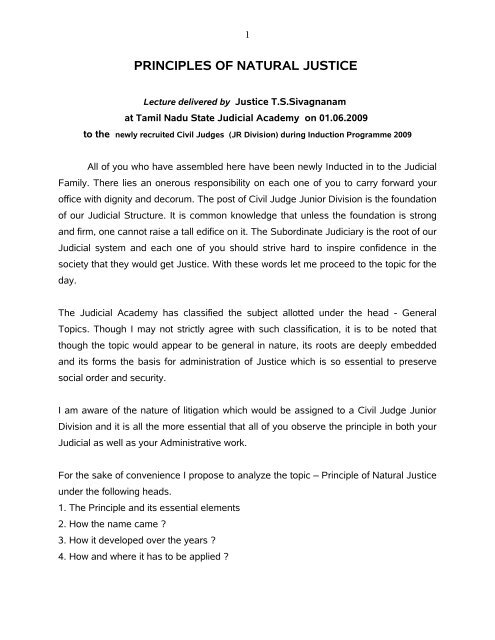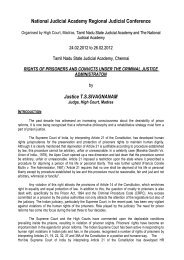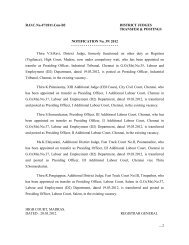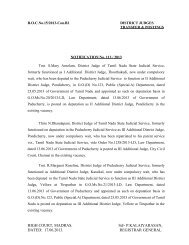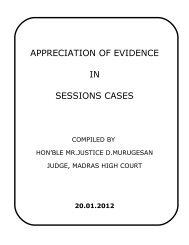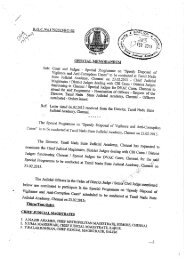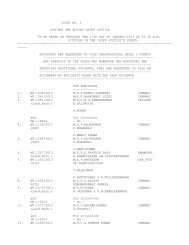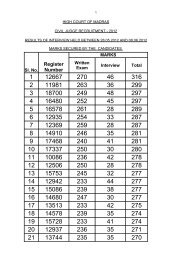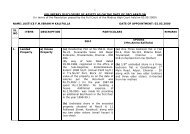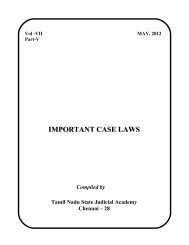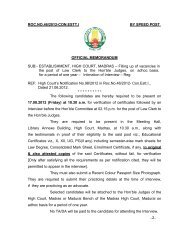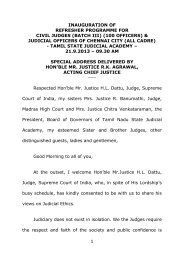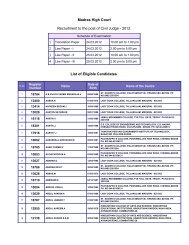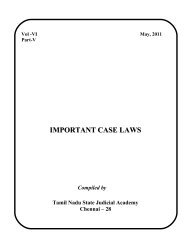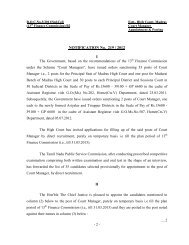PRINCIPLES OF NATURAL JUSTICE - Madras High Court
PRINCIPLES OF NATURAL JUSTICE - Madras High Court
PRINCIPLES OF NATURAL JUSTICE - Madras High Court
You also want an ePaper? Increase the reach of your titles
YUMPU automatically turns print PDFs into web optimized ePapers that Google loves.
1<br />
<strong>PRINCIPLES</strong> <strong>OF</strong> <strong>NATURAL</strong> <strong>JUSTICE</strong><br />
Lecture delivered by Justice T.S.Sivagnanam<br />
at Tamil Nadu State Judicial Academy on 01.06.2009<br />
to the newly recruited Civil Judges (JR Division) during Induction Programme 2009<br />
All of you who have assembled here have been newly Inducted in to the Judicial<br />
Family. There lies an onerous responsibility on each one of you to carry forward your<br />
office with dignity and decorum. The post of Civil Judge Junior Division is the foundation<br />
of our Judicial Structure. It is common knowledge that unless the foundation is strong<br />
and firm, one cannot raise a tall edifice on it. The Subordinate Judiciary is the root of our<br />
Judicial system and each one of you should strive hard to inspire confidence in the<br />
society that they would get Justice. With these words let me proceed to the topic for the<br />
day.<br />
The Judicial Academy has classified the subject allotted under the head - General<br />
Topics. Though I may not strictly agree with such classification, it is to be noted that<br />
though the topic would appear to be general in nature, its roots are deeply embedded<br />
and its forms the basis for administration of Justice which is so essential to preserve<br />
social order and security.<br />
I am aware of the nature of litigation which would be assigned to a Civil Judge Junior<br />
Division and it is all the more essential that all of you observe the principle in both your<br />
Judicial as well as your Administrative work.<br />
For the sake of convenience I propose to analyze the topic – Principle of Natural Justice<br />
under the following heads.<br />
1. The Principle and its essential elements<br />
2. How the name came ?<br />
3. How it developed over the years ?<br />
4. How and where it has to be applied ?
2<br />
1. The Principle and essential elements of Natural Justice:<br />
In a famous English decision in Abbott vs. Sullivan reported in (1952) 1 K.B.189<br />
at 195 it is stated that “the Principles of Natural Justice are easy to proclaim, but their<br />
precise extent is far less easy to define”. It has been stated that there is no single<br />
definition of Natural Justice and it is only possible to enumerate with some certainty the<br />
main principles. During the earlier days the expression natural Justice was often used<br />
interchangeably with the expression natural Law, but in the recent times a restricted<br />
meaning has been given to describe certain rules of Judicial Procedure.<br />
There are several decision of the Hon’ble Supreme <strong>Court</strong> which I shall refer at the<br />
appropriate place and these Judgments are sufficient to summarize and explain the two<br />
essential elements of Natural Justice namely<br />
a. No man shall be Judge in his own cause<br />
b. Both sides shall be heard, or audi alteram partem<br />
The other principles which have been stated to constitute elements of Natural Justice<br />
are<br />
i. The parties to a proceedings must have due notice of when the <strong>Court</strong> / Tribunal will<br />
proceed<br />
ii. The <strong>Court</strong> / Tribunal must act honestly and impartially and not under the dictation of<br />
other persons to whom authority is not given by Law<br />
These two elements are extensions or refinements of the two main principles stated<br />
above.<br />
2. How the expression Natural Justice came ?<br />
We have seen the essential elements of Natural Justice and its extensions or<br />
refinements. In Maclean vs. The Workers Union (1929) 1 Ch. 602, 624 it has been<br />
stated as follows.
3<br />
“The phrase is, of course, used only in a popular sense and must not be taken to mean<br />
that there is any justice natural among men. Among most savages there is no such<br />
thing as Justice in the modern sense. In ancient days a person wronged executed his<br />
own justice. Amongst our own ancestors, down to the thirteenth century, manifest<br />
felony, such as that of a manslayer taken with his weapon, or a thief with the stolen<br />
goods, might be punished by summary execution without any form of trial. Again, every<br />
student has heard of compurgation and of ordeal; and it is hardly necessary to observe<br />
that (for example) a system of ordeal by water in which sinking was the sign of<br />
innocence and floating the sign of guilt, a system which lasted in this country for<br />
hundreds of years, has little to do with modern ideas of justice. It is unnecessary to give<br />
further illustrations. The truth is that justice is a very elaborate conception, the<br />
growth of many centuries of civilization; and even now the conception differs<br />
widely in countries usually described as civilized”.<br />
Natural Justice has been defined in various cases and a few instances are given<br />
below.<br />
• In Drew V. Drew and Lebura (1855 (2) Macg. 1.8, Lord Cranworth defined it as<br />
“universal Justice”.<br />
• In James Dunber Smith v. Her Majesty the Queen (1877-78 (3) App Case 614,<br />
623 JC) Sir Robort P.Collier, Speaking for the Judicial Committee of Privy<br />
Council, used the phrase ‘the requirements of substantial justice’.<br />
• In Arthur John Specman v. Plumstead District Board of Works (1884-85 (10) App<br />
Case 229, 240), Earl of Selbourne, S.C. preferred the phrase ‘the substantial<br />
requirement of justice’.<br />
• In Vionet v. Barrett (1885 (55) LJRD 39, 41), Lord Esher, MR defined natural<br />
justice as ‘the natural sense of what is right and wrong’.<br />
• While however, deciding Hookings vs. Smethwick Local Board of Health (1890<br />
(24) QBD 712), Lord Fasher, M.R. instead of using the definition given earlier by<br />
him in Vionet’s case (supra) chose to define natural justice as ‘fundamental<br />
justice’.
4<br />
• In Ridge v. Baldwin (1963 (1) WB 569, 578), Harman LJ, in the <strong>Court</strong> of appeal<br />
countered natural justice with ‘fair play in action’ a phrase favoured by<br />
Bhagawati, J. in Meneka Gandhi vs. Union of India (1978 92) SCR 621).<br />
• In Re R.N. (An Infaot) (1967 (2) B. 617, 530P, Lord Parker, C.J., preferred to<br />
describe natural justice as ‘a duty to act fairly’.<br />
• In Fairmount Investments Ltd., vs. Secretary to State for Environment (1976<br />
WLR 1255) Lord Russell of Willowan somewhat picturesquely, described natural<br />
justice as ‘a fair crack of the whip’<br />
• Geoffrey Lane, LJ in Regina vs. Secretary of State for Home Affairs Ex Parte<br />
Hosenball (1977 (1) WLR 766) preferred the homely phrase ‘common fairness’.<br />
3. How the Principles of Natural Justice developed over the years ?<br />
The two essential elements had been stated of which the first being that no man shall<br />
be Judge in his own cause.<br />
Judges, like Caesar’s wife, should be above suspicion. The Principle is not confined<br />
merely to the case where the Judge is an actual party to a cause, but applies to a cause<br />
in which he has an interest. An “Interest”, has been defined as a legal interest or a<br />
pecuniary interest and is to be distinguished from “favour”. Such an interest will<br />
disqualify a Judge. The interest (or bias) which disqualifies must be one in the matter to<br />
be litigated. A mere general interest in the general object to be pursued will not<br />
disqualify a magistrate. The interest or bias which disqualifies is an interest in the<br />
particular case, something reasonably likely to bias or influence the minds of the<br />
magistrates in the particular case. The Law in laying down this strict rule has regard, not<br />
to the motive which might bias the Judge but it is to promote the feeling of confidence in<br />
the administration of Justice. As the famous saying goes – Justice should not only be<br />
done but should manifestly and undoubtedly be seem to be done.<br />
The second principle - Audi Alteram Partem – as the maxim denotes that no one should<br />
be condemned unheard. This principle could be broadly classified as under.<br />
i. party to an action is prima facie entitled to be heard in his presence<br />
ii.<br />
he is entitled to dispute his opponent’s case, cross examine his opponents
5<br />
witnesses and entitled to call his own witnesses and give his own evidence<br />
before <strong>Court</strong>.<br />
iii. He is entitled to know the reasons for the decision rendered by a <strong>Court</strong> /<br />
Tribunal.<br />
You are all aware about the famous decision of the Hon’ble Supreme <strong>Court</strong> in Union of<br />
India vs. Tulsiram Patel reported in AIR 1985 Supreme <strong>Court</strong> page 1416. The issue<br />
before the Supreme <strong>Court</strong> was relating to the interpretation of Articles 309, 310 and 311<br />
of the Constitution of India and in particular after the amendment of Clause 2 of Article<br />
311 by the Constitution (forty second amendment) Act, 1976, the second proviso to that<br />
clause. Though the subject matter of the decision related to a service matter and the<br />
safe guards conferred in Article 311 to persons employed in Civil capacities under the<br />
Union of India or the State, the Supreme <strong>Court</strong> analysed in depth the principles of<br />
natural justice. It was stated that the principles of natural justice are not the creation of<br />
Article 14 of the Constitution of India and that Article 14 is not their begetter but their<br />
Constitutional Guardian. The Supreme <strong>Court</strong> traced the ancestry of the principle which<br />
we had seen at some length in the previous part of this lecture.<br />
In the case of Tulsiram Patel the Supreme <strong>Court</strong> considered the issue as to how the<br />
principles of natural justice had been interpreted by <strong>Court</strong>s and within what limits are<br />
they to be confined. It was stated that by a process of judicial interpretation two rules<br />
have been evolved has representing the principles of natural justice in judicial process,<br />
including therein quasi judicial and administrative process. They being<br />
a. no man shall be a Judge in his own cause<br />
b. hear the other side – Audi Alteram Partem<br />
From the above two rules a corollary has been deduced namely that he who shall<br />
decide anything without the other side having been heard, although he may have said<br />
what is right, will not have done what is right, in other words has it is now expressed,<br />
Justice should not only be done but should manifestly be seem to be done.
6<br />
While considering the Audi Alteram Partem rule it was observed that<br />
a person against whom an order to his prejudice may be passed should be<br />
informed of the charges against him.<br />
Such person should be given an opportunity of submitting his explanation which<br />
also include the right to no the oral and documentary evidence which are to be<br />
used against him.<br />
Witnesses who are to give evidence against him be examined in his persons with<br />
right to cross examine them.<br />
To lead his own evidence both oral and documentary, in his defence.<br />
The Hon’ble Supreme <strong>Court</strong> in AIR 1963 SC page 1, Viswanathan vs. Abdul Wajid while<br />
adjudicating a civil dispute inrespect of the Estate of one Ramalinga Mudaliar<br />
considered the scope of Section 13 of the code of Civil Procedure which deals with the<br />
effect of Foreign Judgments. For the purpose of the todays topic it would be useful to<br />
refer to paragraph 40 and 41 of the Judgment which is as follows.<br />
The plea that a foreign Judgment is contrary to natural justice has to be considered in<br />
the light of the statute law of India and there is nothing in S.13 which warrants the<br />
interpretation that a plea that a foreign judgment is contrary to natural justice is<br />
admissible only if the party setting up the plea is not duly served, or has not been given<br />
an opportunity of being heard.<br />
It is the essence of a judgment of a <strong>Court</strong> that it must be obtained after due observance<br />
of the judicial process, i.e., the <strong>Court</strong> rendering the judgment must observe the<br />
minimum requirements of natural justice – it must be composed of impartial persons,<br />
acting fairly, without bias, and in good faith; it must give reasonable notice to the parties<br />
to the dispute and afford each party adequate opportunity of presenting his case. A<br />
foreign judgment of a competent court is conclusive even if it proceeds on an erroneous<br />
view of he evidence or the law, if the minimum requirements of the judicial process are<br />
assured: correctness of the judgment in law or on evidence is not predicated as a<br />
condition nfor recognition of its conclusiveness by the municipal <strong>Court</strong>. Neither the
7<br />
foreign substantive law, nor even the procedural law of the trial be the same or similar<br />
as in the municipal court. A judgment will not be conclusive, however, if the proceeding<br />
in which it was obtained is opposed to natural justice. The words of the statute make it<br />
clear that to exclude a judgment under CI. (d) from the rule of conclusiveness the<br />
procedure must be opposed to natural justice. A judgment which is the result of bias or<br />
want of impartiality on the part of a Judge will be regarded as a nullity and the trial<br />
coram non judice.<br />
The Hon’ble Supreme <strong>Court</strong> in Canara Bank and others vs. Sri Debasis Das and others<br />
reported in AIR 2003 Supreme <strong>Court</strong> 2041 while considering the scope and ambit of the<br />
Canara Bank Officers Employees (conduct) Regulations 1976 had analyzed in depth<br />
“Natural Justice” and “Audi Alteram Partem”. The observation in the said Judgment<br />
could be summarized as follows:<br />
Natural Justice is another name of commonsense Justice.<br />
Rules of Natural Justice are not codified canons.<br />
But they are principles ingrained into the conscience of man.<br />
Natural Justice is the administration of Justice in a commonsense liberal way.<br />
Justice is based substantially on natural Justice is based substantially on natural<br />
ideals and human values.<br />
The administration of Justice is to be freed from the narrow and restricted<br />
considerations which are usually associated with a formulated law involving linguistic<br />
technicalities and grammatical niceties.<br />
It is the substance of Justice which has to determine its form.<br />
The expressions “Natural Justice” and “Legal Justice” do not present a water tight<br />
classification.<br />
It is the substance of Justice which is to be secured by both and when ever legal<br />
Justice fails to achieve this solemn purpose, natural Justice is called in aid of legal<br />
Justice.<br />
Natural Justice relieves legal Justice from unnecessary technicality, grammatical<br />
pedantry or logical prevarication.
8<br />
It supplies the omissions of a formulated law.<br />
As Lord Buckmaster said, no form or procedure should ever be permitted to exclude<br />
the presentation of a litigants’ defence.<br />
The adherence to principles of Natural Justice as recognized by all civilized States is<br />
of Supreme importance when a quasi – judicial body embarks on determining<br />
disputes between the parties, or any administrative action involving civil<br />
consequences is in issue.<br />
Notice it is the first limb of the principle of Audi Alteram Partem.<br />
Notice should apprise the party the case he has to meet.<br />
Adequate time should be given to make his representation.<br />
In reason time the concept of Natural Justice has undergone a great deal of change. In<br />
the sense that what particular rule of Natural Justice to be applied depends upon the<br />
facts of that case, the statute governing the issue etc. The old distinction between an<br />
Administrative Act and Judicial Act does not survive any longer. Every Administrative<br />
order which involves civil consequences must follow the rules of Natural Justice.<br />
The Hon’ble Supreme <strong>Court</strong> has held that in the absence of a notice and reasonable<br />
opportunity to a person to meet the case against him, the order passed becomes wholly<br />
vitiated. Having held so the Principles of Natural Justice have been interpreted by the<br />
Hon’ble Supreme <strong>Court</strong> prescribing the limits to which they are to be confined.<br />
What is known as “useless formality theory” was considered by the Hon’ble Supreme<br />
<strong>Court</strong> in M.C.Mehta vs. Union of India (AIR 1999 Supreme <strong>Court</strong> page 2583). In the<br />
said Judgment it was held<br />
“Before we go into the final aspect of this contention, we would like to state that case<br />
relating to breach of natural justice do also occur where all facts are not admitted or are<br />
not all beyond dispute. In the context of those cases there is a considerable case law<br />
and literature as to whether relief can be refused even if the <strong>Court</strong> thinks that the case<br />
of the applicant is not one of “real substance” or that there is no substantial possibility of
9<br />
his success or that the result will not be different, even if natural justice is followed”<br />
The Hon’ble Supreme <strong>Court</strong> in Bar Council of India vs. <strong>High</strong> <strong>Court</strong>, Kerala reported<br />
(2004) 6 SCC 311, held that principles of Natural Justice cannot to be put in a strait<br />
jacket formula, it must be viewed with flexibility and when there is compliant of violation<br />
of Principles of Natural Justice the <strong>Court</strong> may insists on proof of prejudice before<br />
interfering or setting aside an order.<br />
In the earlier part this decision we had seen that recording of reasons in an order<br />
passed by a <strong>Court</strong> or a Tribunal is also one of the principles of the Audi Alteram Partem<br />
Rule. The Hon’ble Supreme <strong>Court</strong> in Sri Jain Swetambar Terapanthi Vid (s) vs.<br />
Phundan Singh reported in AIR 1999 SC 2322 was considering the validity of an<br />
Appellate <strong>Court</strong> against and grant of injunction. In the said case the Trial <strong>Court</strong> granted<br />
an order of injunction and the Appellate <strong>Court</strong> upset the order of injunction granted by<br />
the Trial <strong>Court</strong> on the ground that the Trial <strong>Court</strong> has gone wrong in recording primafacie<br />
satisfaction. The Hon’ble Supreme <strong>Court</strong> set aside the order of the Appellate <strong>Court</strong><br />
on the ground that the Appellate <strong>Court</strong> did not discuss the materials on record nor<br />
recorded contrary finding. It would be useful to refer to the findings recorded by the Trial<br />
<strong>Court</strong>.<br />
“Petitioner has been successful, in my opinion, to establish the prima facie cases in its<br />
favour. I am of the opinion that if the order of temporary injunction, as prayed for, is not<br />
passed the interest of Petitioner as well as students, staff and guardian wil be adversely<br />
affected in view of the fact that the allegations against O.P. Nos. 1 to 5 which have<br />
been established prima facie are very serious. In view of that I am inclined to allow the<br />
instant Petition for temporary injunction.<br />
This finding of the Trial <strong>Court</strong> was reversed by the Appellate <strong>Court</strong> which came up for<br />
consideration before the Hon’ble Supreme <strong>Court</strong> in the said case. The Supreme <strong>Court</strong><br />
while analyzing the aspects regarding prima-facie satisfaction and the need to record<br />
reasons observed as follows.
10<br />
It may be pointed out that it is one thing to conclude that the Trial <strong>Court</strong> has not<br />
recorded its prima facie satisfaction on merits but granted the temporary injunction and<br />
it is another thing to hold that Trial <strong>Court</strong> has gone wrong in recording the prima facie<br />
satisfaction and setting aside that finding on the basis of the material on record because<br />
it has not considered the relevant material or because it has erroneously reached the<br />
finding or conclusions on the facts established. In the first situation, the appellate <strong>Court</strong><br />
will be justified in upsetting the order under appeal even without going into the merits of<br />
the case but in the second eventuality, it cannot set aside the impugned order without<br />
discussing the material on record and recording a contrary finding. The <strong>High</strong> <strong>Court</strong><br />
proceeded to set aside the order of the Trial <strong>Court</strong> on the first ground ignoring the<br />
aforementioned findings of the Trial <strong>Court</strong>, the order under appeal is, therefore,<br />
unsustainable.<br />
In yet another case the Supreme <strong>Court</strong> while considering a proceedings arising out of a<br />
general <strong>Court</strong> martial confirmed by Chief of Army Staff reported in AIR 1990 Supreme<br />
<strong>Court</strong> 1984 in S.N.Mukherjee vs. Union of India observed that in view of the expanding<br />
horizon of the principles natural justice, the requirement to record reason can be<br />
regarded as one of the principles of natural justice which govern exercise of power by<br />
administrative authorities. The rules of natural justice are not embodied rules. The<br />
extent of their application depends upon the particular statutory framework where under<br />
jurisdiction has been conferred on the administrative authority. With regard to the<br />
exercise of a particular power by an administrative authority including exercise of<br />
judicial or quasi judicial functions the legislature, while conferring the said power, may<br />
feel that it would not be in the larger public interest that the reasons for the order passed<br />
by the administrative authority be recorded in the order and be communicated to the<br />
aggrieved party and it may dispense with such a requirement. It may do so by making<br />
an express provision to that effect. Such an exclusion can also arise by necessary<br />
implication from the nature of the subject matter, the scheme and the provisions of the<br />
enactment. The public interest underlying such a provision would outweigh the salutary<br />
purpose served by the requirements cannot, therefore, the insisted upon in such a case.<br />
Therefore except in cases where the requirement has been dispensed with expressly or<br />
by necessary implication, an administrative authority exercising judicial or quasi judicial
11<br />
functions is required to record the reasons for its decision.<br />
In the famous Meneka Gandhi vs. Union of India reported in AIR 1978 Supreme <strong>Court</strong><br />
597 the Hon’ble Supreme <strong>Court</strong> discussed the increasing importance of Natural Justice<br />
and observed that Natural Justice is a great humanizing principle intended to invest law<br />
with fairness and to secure Justice and over the years it has grown in to a widely<br />
pervasive rule. The Supreme <strong>Court</strong> extracted a speech of Lord Morris in the House of<br />
Lords which is an very interesting speech (I quote)<br />
That the conception of natural justice should at all stages guide those who discharge<br />
judicial functions is not merely an acceptable but is an essential part f the philosophy of<br />
the law. We often speak of the rules of natural justice. But there is nothing rigid or<br />
mechanical about them. What they comprehend has been analysed and described in<br />
many authorities. But any analysis must bring into relief rather their spirit and their<br />
inspiration than any precision of definition nor precision as to application. We do not<br />
search for prescriptions which will lay down exactly what must, in various divergent<br />
situations, be done. The principle and procedures are to be applied which, in any<br />
particular situation or set of circumstances, are right and just and fair. Natural justice, it<br />
has been said, is only “fair play in action”. Nor do we wait for directions from Paliament.<br />
The common law has abundant riches; there may we find what Byles, J., called “the<br />
justice of the common law”,. Thus, the soul of natural justice is fair play in action and<br />
that is why it has received the widest recognition throughout the democratic world. In<br />
the United States, the right to an administrative hearing is regarded as essential<br />
requirement of fundamental fairness. And in England too it has been held that “fair play<br />
in action” demands that before any prejudicial or adverse action is taken against a<br />
person, he must be given an opportunity to be heard. The rule was stated by Lord<br />
Denning, M.R. in these terms in Schmidt v.Secy. of State for Home Affairs: - (1969) 2<br />
Ch. D 149 “Where a public officer has power to deprive a person of his liberty or his<br />
property, the general principle is that it has not to be done without his being given an<br />
opportunity of being heard and of making representations on his own behalf”.


